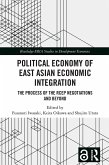Dieser Download kann aus rechtlichen Gründen nur mit Rechnungsadresse in A, B, BG, CY, CZ, D, DK, EW, E, FIN, F, GR, HR, H, IRL, I, LT, L, LR, M, NL, PL, P, R, S, SLO, SK ausgeliefert werden.
Hinweis: Dieser Artikel kann nur an eine deutsche Lieferadresse ausgeliefert werden.
"Carr's concern is that development and globalization, as currently pursued, are creating more poverty than they solve, needlessly producing economic and environmental challenges that put everyone on Earth at risk. Confronting this paradoxical outcomehead-on, Carr questions the "wisdom" of the traditional development-via-globalization strategy, a sort of connect-the-development-dots, by arguing that in order to connect the dots one must first see the dots. By failing to do so, agencies do not understand what they are connecting and why. This fundamental questioning of Post WWII development strategies, grounded in life along "Globalization's Shoreline," sets his approach to development in the age of globalization apart from much of the contemporary development literature." Michael H. Glantz, Director, CCB (Consortium for Capacity Building), INSTAAR, University of Colorado
"Over the fifty years since the end of the colonial era, rich nations have granted Africa billions of dollars in development aid the equivalent of six Marshall Plans and yet, today, much of the continent is as desperate as ever for help. In Delivering Development, Edward Carr delves into the question ofwhy the aid system has failed to deliver on its promises, and offers a provocative thesis: that economic development, at least as international donors define it, is not necessarily equal to advancement. Unlike many combatants in the debate over the causes of global poverty, who jet in and out of these countries and offer the view from 10,000 feet, Carr takes a novel approach to the problem. He examines the aid system as it is actually experienced by poor Africans. Delivering Development focuses on a pair of Ghanaian villages, which despite their poverty by statistical measures have nonetheless managed to construct sophisticated systems of agricultural cultivation and risk management. Carr doesn't argue that these places hold the secret to ending poverty. On the contrary, his point is that there are no overarching solutions, that each community holds a unique set of keys to its own future. By delving into development at the grassroots, Carr reveals the rich and bedeviling complexity of a problem that, all too often, is reduced to simplistic ideological platitudes." Andrew Rice, author of The Teeth May Smile but the Heart Does Not Forget: Murder and Memory in Uganda
"Most certainly, this book makes an important contribution to critical literatures on globalization and development. While critical of development within global economic and political practices, Carr remains optimistic of the potential for development to alleviate poverty. . .Very importantly, the book iswritten in accessible language that is appropriate for a diverse audience including those working within development and policy, students and researchers, and the general public. The book would be a useful teaching tool at the undergraduate level, especially as it provides clear and concise descriptions of the changing political and economic contexts in which the residents of Dominase and Ponkrum in Ghana have made their livings, while tying these processes to broader, socially
relevant concepts of development, globalization, and sustainability." - Kelsey B. Hanrahan, Africa Today









